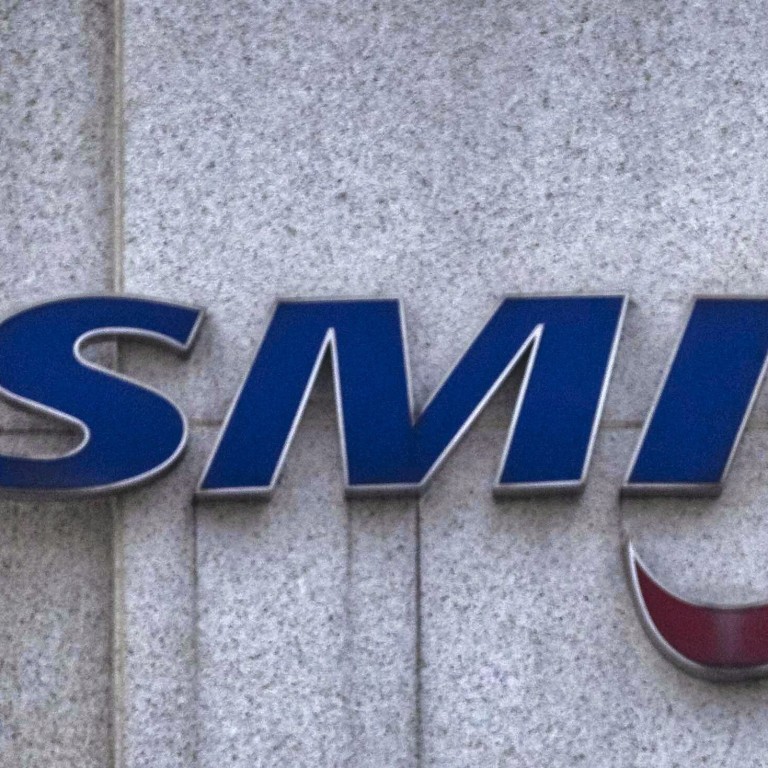
Chinese chip-maker SMIC reports record high revenue but warns US export curbs have delayed some equipment
- SMIC says it has been actively communicating with US government, suppliers to help obtain the licences it needs for US-origin equipment
- SMIC says US restrictions have delayed supply of some equipment, affecting investment and capacity plans
China’s leading foundry Semiconductor Manufacturing International Corporation (SMIC) reported record high revenue of US$1.08 billion for the July-September quarter, a 32.6 per cent increase from the same period a year ago, but warned that US export restrictions had delayed the supply of some US-made parts and equipment.
Shanghai-based SMIC’s revenue was boosted by increased consumer demand for smartphones and smart home products – for which it supplies chips – although restrictions on US-origin technology could impact its capital spending and capacity expansion plans going forward.
“The first impact [of US export controls] is on our scheduled capacity expansion,” said Zhao Haijun, SMIC co-chief executive officer, during an earnings call with analysts on Thursday. He added that SMIC was still “in the process of application” for some machines aimed at planned wafer production in the fourth quarter and first quarter of 2021, with a “two-month delay” on certain ones.
Zhao said SMIC has been communicating with the US government and working with US suppliers to obtain the licences it needs for certain US-origin equipment, parts and raw materials. He said US export restrictions may impact both 8 and 12-inch wafer production lines and its advanced and mature process nodes business going forward.
SMIC supplier agrees to buy used ASML machine to aid in national chip drive
SMIC, which uses a large amount of US-origin tech in its production lines, has been caught up in a widening tech war between the US and China. This has seen the US add more Chinese companies, such as Huawei and leading Chinese AI and semiconductor companies, to its trade blacklist on national security grounds. China meanwhile has been on a drive to achieve greater self-reliance in strategic technology sectors, such as semiconductor production.
The US Commerce Department told SMIC’s US suppliers in September to apply for a licence to sell certain technologies to the Chinese company after a review concluded that SMIC’s chips might be used by the Chinese military – an assertion that SMIC has denied. SMIC has also fallen under US restrictions – effective September 15 – that curb the supply of chips to Huawei using US-origin technology.
Wafers for smartphones accounted for 46.1 per cent of SMIC’s revenue in the third quarter, up from 42.3 per cent in the same period a year earlier, followed by a 20.5 per cent contribution from wafers for smart-home products. Sales from mainland China and Hong Kong contributed 69.7 per cent of total revenue, up from 60.5 per cent previously.
“The production capacities at global foundries, including SMIC, have been quite sought after this year,” said He Hui, Shanghai-based chief semiconductor analyst with Omdia, a tech-focused market research company. “SMIC does not need to worry about not having enough clients.”
A ban on SMIC will affect Huawei, Qualcomm and dozens of others
“The demand for low-end chips is quite strong in China right now,” said Mo Cheng, a Shanghai-based analyst. “Even if SMIC cannot produce for Huawei, they can produce chips for others.”
SMIC, founded in 2000 by Richard Chang who worked for many years at Texas Instruments, is China’s flag-bearer of advanced semiconductor manufacturing. However, many experts have said US curbs could hit SMIC’s pursuit of more advanced process nodes, such as 14nm and 7nm technology, required for the most sophisticated electronics applications.
In response to an analyst question about not being able to produce chips for Huawei after mid-September, Liang Meng Song, Co-CEO of SMIC, said the company’s products were “not designed for a single customer” and its businesses are “diversified enough to switch capacity” to others over time.

